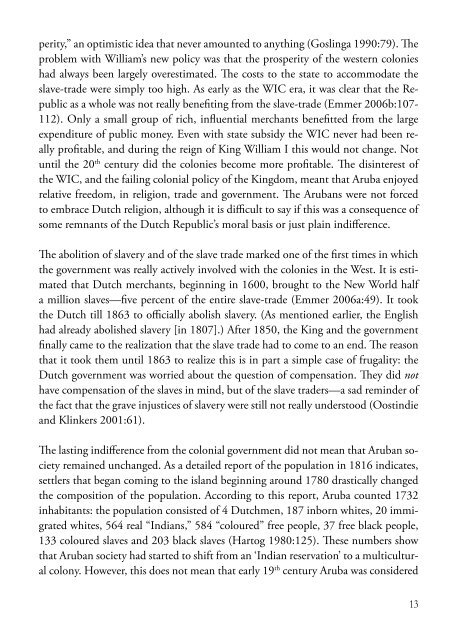Aruba navigating globalizing world.pdf - sociology-of-development
Aruba navigating globalizing world.pdf - sociology-of-development
Aruba navigating globalizing world.pdf - sociology-of-development
Create successful ePaper yourself
Turn your PDF publications into a flip-book with our unique Google optimized e-Paper software.
perity,” an optimistic idea that never amounted to anything (Goslinga 1990:79). The<br />
problem with William’s new policy was that the prosperity <strong>of</strong> the western colonies<br />
had always been largely overestimated. The costs to the state to accommodate the<br />
slave-trade were simply too high. As early as the WIC era, it was clear that the Republic<br />
as a whole was not really benefiting from the slave-trade (Emmer 2006b:107-<br />
112). Only a small group <strong>of</strong> rich, influential merchants benefitted from the large<br />
expenditure <strong>of</strong> public money. Even with state subsidy the WIC never had been really<br />
pr<strong>of</strong>itable, and during the reign <strong>of</strong> King William I this would not change. Not<br />
until the 20 th century did the colonies become more pr<strong>of</strong>itable. The disinterest <strong>of</strong><br />
the WIC, and the failing colonial policy <strong>of</strong> the Kingdom, meant that <strong>Aruba</strong> enjoyed<br />
relative freedom, in religion, trade and government. The <strong>Aruba</strong>ns were not forced<br />
to embrace Dutch religion, although it is difficult to say if this was a consequence <strong>of</strong><br />
some remnants <strong>of</strong> the Dutch Republic’s moral basis or just plain indifference.<br />
The abolition <strong>of</strong> slavery and <strong>of</strong> the slave trade marked one <strong>of</strong> the first times in which<br />
the government was really actively involved with the colonies in the West. It is estimated<br />
that Dutch merchants, beginning in 1600, brought to the New World half<br />
a million slaves—five percent <strong>of</strong> the entire slave-trade (Emmer 2006a:49). It took<br />
the Dutch till 1863 to <strong>of</strong>ficially abolish slavery. (As mentioned earlier, the English<br />
had already abolished slavery [in 1807].) After 1850, the King and the government<br />
finally came to the realization that the slave trade had to come to an end. The reason<br />
that it took them until 1863 to realize this is in part a simple case <strong>of</strong> frugality: the<br />
Dutch government was worried about the question <strong>of</strong> compensation. They did not<br />
have compensation <strong>of</strong> the slaves in mind, but <strong>of</strong> the slave traders—a sad reminder <strong>of</strong><br />
the fact that the grave injustices <strong>of</strong> slavery were still not really understood (Oostindie<br />
and Klinkers 2001:61).<br />
The lasting indifference from the colonial government did not mean that <strong>Aruba</strong>n society<br />
remained unchanged. As a detailed report <strong>of</strong> the population in 1816 indicates,<br />
settlers that began coming to the island beginning around 1780 drastically changed<br />
the composition <strong>of</strong> the population. According to this report, <strong>Aruba</strong> counted 1732<br />
inhabitants: the population consisted <strong>of</strong> 4 Dutchmen, 187 inborn whites, 20 immigrated<br />
whites, 564 real “Indians,” 584 “coloured” free people, 37 free black people,<br />
133 coloured slaves and 203 black slaves (Hartog 1980:125). These numbers show<br />
that <strong>Aruba</strong>n society had started to shift from an ‘Indian reservation’ to a multicultural<br />
colony. However, this does not mean that early 19 th century <strong>Aruba</strong> was considered<br />
13


